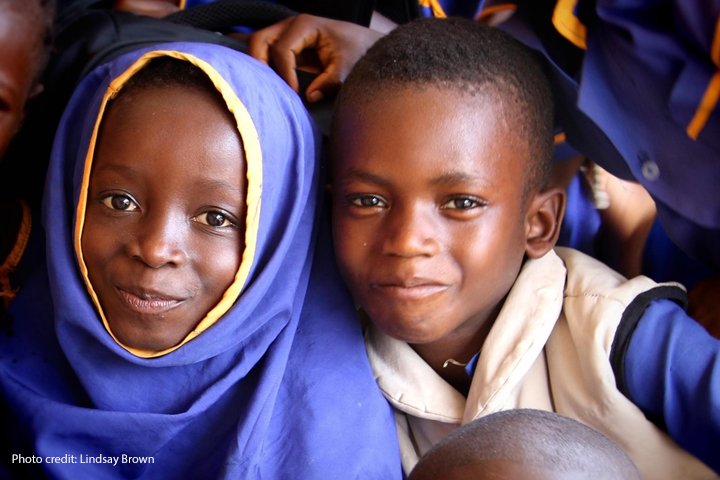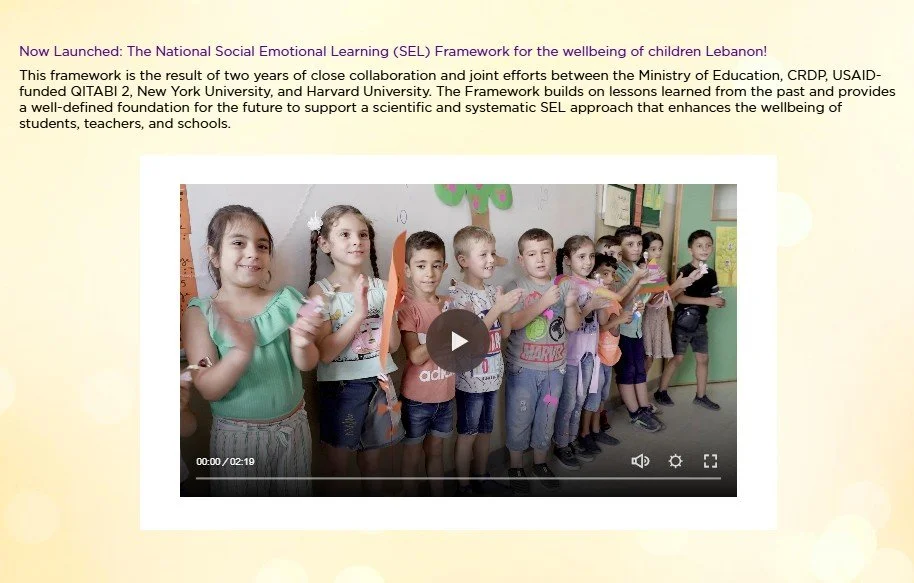Resources
Thinking outside the classroom: Theories of change and measures to support the design, monitoring, and evaluation of distance learning programs
This report is intended to be a living framework for thinking and talking about distance education interventions, beginning in low- and middle-income (LMIC) and humanitarian contexts and expanding over time to include distance education interventions designed for high-income contexts.
Global TIES for Children Co-Director, Hirokazu Yoshikawa Receives SRCD’S 2023 Distinguished Contributions to Public Policy and Practice in Child Development Award
Hirokazu Yoshikawa has been awarded a 2023 Biennial Award for Distinguished Contributions to Public Policy and Practice in Child Development Award by the Society for Research in Child Development. The award is given in recognition of an individual’s continuous lifetime contributions to research that informs policy and practice for the benefit of children.
Measuring the dosage of brief and skill-targeted social-emotional learning (SEL) activities in humanitarian settings
In humanitarian settings, social-emotional learning (SEL) programs for children are often delivered using a field-feasible approach where the programs are more easily deployable and adaptable in the field, require minimal training, and depend less on the strict sequence and structure of the program components to elicit the intended treatment effect. However, evidence is lacking on what aspects of this implementation approach enable the SEL programming to be more beneficial to children’s SEL development.
Remedial Education to Support Learning Loss Threatened by Cuts to Development Aid
This blog is written by Dr Lindsay Brown, Senior Research Scientist at NYU-Global TIES in Steinhardt School of Culture, Education, and Human Development. Lindsay primarily investigates how to support teachers in areas of conflict and crisis with a focus on flexible and scalable teacher professional development strategies. She works mainly in the Middle East and Africa.
Image credit:
Pawel Czerwinski
@pawel_czerwinski via Unsplash.
Now Launched: The National Social Emotional Learning (SEL) Framework for the wellbeing of children Lebanon!
This framework is the result of two years of close collaboration and joint efforts between the Ministry of Education, CRDP, USAID-funded QITABI 2, New York University, and Harvard University. The Framework builds on lessons learned from the past and provides a well-defined foundation for the future to support a scientific and systematic SEL approach that enhances the wellbeing of students, teachers, and schools.
Testing the impact of a skill-targeted social and emotional learning curriculum and its variation by pre- and postmigration conflict experiences…
Refugee children face significant adversities that can threaten critical developmental processes and hamper learning outcomes. This study examines how post-migration risk factors at the community, household, and individual level experienced by primary school-aged Syrian refugee children in Lebanon (N = 448, Age M = 9.08, SD = 1.90) are associated with cognitive, emotional, and behavioral developmental processes as well as literacy and numeracy performance. We identified several risk factors, including attending a lower grade than their age-expected grade level, that uniquely predict Syrian refugee children's developmental processes and academic outcomes.
Remedial programming and skill-targeted SEL in low-income and crisis-affected contexts: Experimental evidence from Niger
Despite substantial cross-national interest in remedial programming as a way to support low-achieving students, evidence of its effectiveness is rare, particularly in low-income and/or crisis-affected contexts. In this article, we present experimental evidence of the impact of a remedial tutoring program on academic outcomes from a two-level randomized trial of two treatments in Niger: school randomization testing the impact of skill-targeted SEL activities and within-school student-level randomization testing the impact of access to remedial tutoring.
diyddi: A metadata curation and generation shiny app based on the rddi R package
diyddiCurator is a graphic user interface to the rddi package. It is a shiny app designed to streamline metadata generation for research data sharing. It allows the user to input project metadata and generate a valid Data Documentation Initiative Codebook (DDI 2.5) to describe the study and data collected.
DDI elements and their attributes are listed in various tabs and described using handsontable (https://handsontable.com/). By right clicking on the table users can add or delete rows. A human readable README, the DDI Codebook and the data is available for export in the Export navigation menu.
Measuring early learning and development across cultures: Invariance of the IDELA across five countries
Relatively little research has addressed whether conceptual frameworks of early learning generalize across different national contexts. This article reports on a cross-country measurement invariance analysis of the International Development and Early Learning Assessment (IDELA). The IDELA is a direct assessment tool for 3- to 6-year-old children, intended to measure Early Literacy, Early Numeracy, Motor, and Social-Emotional development. Its generalizability is evaluated using samples from 5 countries: Afghanistan (N = 2,629); Bolivia (N = 480); Ethiopia (N = 682); Uganda (N = 504); and Vietnam (N = 675). The 4-domain model of the IDELA was supported in each country, although the domains were highly correlated. Measurement invariance analysis revealed that most IDELA items do not provide a basis for comparing children’s development over the 5 countries. This research supports the use of the IDELA for program evaluation and within-country monitoring purposes, but cautions against its use for international comparisons. (PsycINFO Database Record (c) 2019 APA, all rights reserved)
Measuring Rohingya Children’s Development: Cultural and Contextual Adaptation of IDELA
In this brief, NYU Global TIES for Children researchers describe a rapid iterative process of cultural, linguistic, and contextual adaptation and extension of child assessment tools for Rohingya Children in Cox's Bazar, Bangladesh. It includes three specific examples showcasing the rigorous, culturally responsive, equity-based approach to adaptation. This report also highlights some of the most critical findings from using this extended IDELA, known as IDELA-E, in our pilot study. Results suggest that IDELA-E is responsive to the environment in which the Rohingya children grow up and can capture their learning and development gains across multiple domains. Assessment using IDELA-E shows the age-based developmental progression of Rohingya children across these five domains: fine and gross motor, emergent literacy, emergent numeracy, socio-emotional, and executive function development. Overall, this brief highlights a rigorous process of cultural and contextual adaptation of tools for assessing children in a low-resourced context in the global south.
ERICC Interactive Conceptual Framework
An accompanying interactive infographic to the working paper #1 from the Education Research in Conflict and Protracted Crisis (ERICC) Research Programme Consortium. This paper outlines the theoretical framework governing the studies to be deployed throughout the Consortium's lifetime.
A Conceptual Framework for Education Research in Conflict and Protracted Crisis (ERICC)
Working paper #1 from the Education Research in Conflict and Protracted Crisis (ERICC) Research Programme Consortium. This paper outlines the theoretical framework governing the studies to be deployed throughout the Consortium's lifetime.
What’s in the Water? Positive Parenting & the History of Attachment Theory
Why is it that some countries fluoridate their water? In the mid-20th century, fluoride became linked with reduced tooth decay, sparking a scientific revolution in the dentistry world, and causing cities to begin infusing their water supplies with fluoride. Today, countries add fluoride as a protective factor, as a way to promote healthy early childhood development (ECD). But there is still significant debate around the practice.
Testing Measures of Refugee Camp Environment, Caregiver Mental Health, and Child Social-Emotional Development Among the Rohingya in Cox’s Bazar
In this brief, the fourth in our series, Global TIES researchers show that through analyses of instruments measuring caregivers' perceptions of refugee camp environment, caregiver mental health, and children's social-emotional development, there are reasons for optimism in using these particular scales with the Rohingya community in Cox's Bazar, Bangladesh. Results suggest that the measures examined show generally strong internal reliability and can be successfully adapted for use in this context and they were associated with each other in meaningful ways. In addition to highlighting promising results, this brief also provides a snapshot of the steps involved in selecting, adapting, and testing these scales to examine their suitability and prepare them for large-scale use.
blueprintr: a plugin to drake that adds automated steps for tabular dataset documentation and testing
a plugin to drake that adds automated steps for tabular dataset documentation and testing.
Preventing a Lost Generation in Ukraine: Recommendations for Supporting Education in Emergency Humanitarian Response
This brief is prepared to provide recommendations on promising and practical approaches to support education during the acute crises period in Ukraine and to mitigate the impacts of the Russian invasion on children’s learning and wellbeing. It is primarily designed to support multilateral and bilateral organizations, as well as other actors and stakeholders, to identify priorities and approaches to support education for children affected by the Ukraine crisis. In this brief, we provide:
An overview of the conditions of education for Ukrainian children thus far
Options and priorities for supporting the children affected by the Russian Invasion, both (a) for the children remaining in Ukraine and (b) for the Ukrainian refugee children in neighboring host countries.
State of evidence and implications of future responses and research
Demystifying Informed Consent
Check out how we used multimedia alongside Sesame Workshop to combat critical challenges to the informed consent process, resulting in more active participation from families in the research.
Delivering Quality Research in Culturally Dynamic, Conflict-Affected Contexts: Lessons from Large-Scale Pilot Research in Cox's Bazar
In this third brief in our series, we outline the process and strategies used as we piloted multiple data collection tools that were being considered for use in several large-scale research studies with the Rohingya in Cox's Bazar. This brief aims to provide context and a path forward for future researchers to deliver quality research in this, and other, complex research environments with the ultimate goal of informing the types, design, and delivery of services to support families and foster resilience in these contexts for generations to come.
Comprehensive Study of Refugee Children's Academic, Social, and Emotional Learning Outcomes Yields Key Insights for Post-COVID-19 Return to School
Researchers at Global TIES for Children, an international research center based at NYU Abu Dhabi and NYU New York, examined a variety of post-migration risks faced by Syrian refugee children enrolled in Lebanese public schools and found that students being older than expected for the grade in which they were placed was most consistently and strongly associated with developmental and learning difficulties. As many schools around the world prepare to reopen in 2020 and beyond, the study provides critical insights that can help inform efforts to reintegrate children into schools after significant disruption and time away.





















